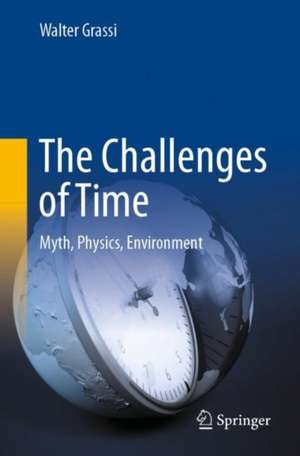The Challenges of Time: Myth, Physics, Environment
Autor Walter Grassien Limba Engleză Paperback – 2 mar 2022
The best-known contribution, or at least the most popular one, came from Einstein. He took the illusion that time was universal, a concept dating back, essentially, to Galileo and Newton, and shattered it, both within and without the scientific community.
Thermodynamics teaches us that time has a preferential direction, i.e., forward, and is irreversible, as shown by Prigogine and his theories on dissipative structures and complex systems. Time is not only an “external spectator” to what happens, but assiduously takes part in making it happen.
The concept of thermodynamics shows us how time is linked with environmental issues, as creator and destroyer. The author explores the relationships of cause and effect and how it can help in measuring the various eras of the planet, as wellas understanding the beings that inhabit it. This book will be a valuable read for students, researchers, and interested laypersons alike.
Preț: 178.13 lei
Nou
Puncte Express: 267
Preț estimativ în valută:
34.08€ • 35.69$ • 28.27£
34.08€ • 35.69$ • 28.27£
Carte disponibilă
Livrare economică 19 martie-02 aprilie
Preluare comenzi: 021 569.72.76
Specificații
ISBN-13: 9783030943714
ISBN-10: 3030943712
Pagini: 146
Ilustrații: X, 146 p. 44 illus., 20 illus. in color.
Dimensiuni: 155 x 235 mm
Greutate: 0.23 kg
Ediția:1st ed. 2022
Editura: Springer International Publishing
Colecția Springer
Locul publicării:Cham, Switzerland
ISBN-10: 3030943712
Pagini: 146
Ilustrații: X, 146 p. 44 illus., 20 illus. in color.
Dimensiuni: 155 x 235 mm
Greutate: 0.23 kg
Ediția:1st ed. 2022
Editura: Springer International Publishing
Colecția Springer
Locul publicării:Cham, Switzerland
Cuprins
Chapter 1 - Introduction.- Chapter 2 - From Myth to Experimental Science.- Chapter 3 - Charges, Magnets and Light.- Chapter 4 - Thermodynamics.- Chapter 5 - The Time of Relativity.- Chapter 6 - The Time of Man and the Time of the Earth.
Notă biografică
After spending a research period at the University of Houston, TX, USA, Prof. Grassi has been involved in experimental and theoretical studies in thermo-fluid-dynamics. As part of this activity, he has engaged in several experimental campaigns in microgravity on parabolic flights, sounding rockets, and satellites funded by the ESA (European Space Agency). He has also been a member of the Physical Science Working Group and chair of a Topical Team of the European Space Agency (ESA).
Prof. Grassi has also performed a broad number of activities on Energy Saving and Management in collaboration with the ENEA (Italian Department of Energy) and has been responsible for several energy contracts. In this context, he has been the president of the Regional Energy Agency (no longer extant) of Tuscany and of the Italian Union of Geothermics.
Prof. Grassi has also performed a broad number of activities on Energy Saving and Management in collaboration with the ENEA (Italian Department of Energy) and has been responsible for several energy contracts. In this context, he has been the president of the Regional Energy Agency (no longer extant) of Tuscany and of the Italian Union of Geothermics.
Textul de pe ultima copertă
This book represents a journey through the history of science in regards to the concept of time, specifically, the question as to whether it is absolute, relative, or irreversible.
The best-known contribution, or at least the most popular one, came from Einstein. He took the illusion that time was universal, a concept dating back, essentially, to Galileo and Newton, and shattered it, both within and without the scientific community.
Thermodynamics teaches us that time has a preferential direction, i.e., forward, and is irreversible, as shown by Prigogine and his theories on dissipative structures and complex systems. Time is not only an “external spectator” to what happens, but assiduously takes part in making it happen.
The concept of thermodynamics shows us how time is linked with environmental issues, as creator and destroyer. The author explores the relationships of cause and effect and how it can help in measuring the various eras of the planet, as well as understanding the beings that inhabit it. This book will be a valuable read for students, researchers, and interested laypersons alike.
Thermodynamics teaches us that time has a preferential direction, i.e., forward, and is irreversible, as shown by Prigogine and his theories on dissipative structures and complex systems. Time is not only an “external spectator” to what happens, but assiduously takes part in making it happen.
The concept of thermodynamics shows us how time is linked with environmental issues, as creator and destroyer. The author explores the relationships of cause and effect and how it can help in measuring the various eras of the planet, as well as understanding the beings that inhabit it. This book will be a valuable read for students, researchers, and interested laypersons alike.
Caracteristici
Presents the latest approach to time, bridging the views of microscopic and macroscopic physics Identifies the appropriate perspective for examining nature Invites readers to think about humankind's responsibilities to the environment
